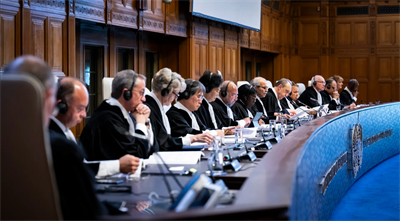
ICJ’s Advisory Opinion
NILSC Hybrid Workshop: Apartheid, Genocide, and Ethnic Cleansing
Convenors: Victor Kattan (Nottingham) and Gerhard Kemp (UWE Bristol)
Allegations of apartheid, genocide, and ‘ethnic cleansing’ have reached the world’s apex court in the cases of South Africa v Israel and Nicaragua v Germany in connection with the armed conflict between Israel, Hamas, and other Palestinian armed groups. Furthermore, the ICJ has also issued an Advisory Opinion concerning the Occupied Palestinian Territory, in which matters pertaining to apartheid, humanitarian law and related legal frameworks were prominently addressed. These cases raise questions concerning the normative content, elements, definition, status, and interrelationship between annexation, apartheid, genocide, and ethnic cleansing in the context of Palestine, and the factual events in Gaza in particular.
In this workshop, scholars with expertise in apartheid, genocide, ethnic cleansing, and the Palestine question, will convene to discuss the relationship between apartheid, genocide, and ethnic cleansing. Presentations will be centred on the following and related questions:
- What are the differences/similarities between the definitions of the crimes of apartheid, genocide, and the phenomenon (or crime) of ethnic cleansing? How do we approach the question of (specific) intent?
- Where can we look to determine/define the crimes – whereas the crimes of apartheid and genocide are defined in subject-specific conventions, ethnic cleansing is not a legal term of art, and the (related) crime of deportation or forcible transfer of population is defined in an international criminal law treaty that is specific to the ICC.
- Can the history and sociology of annexation, apartheid, genocide, and ethnic cleansing inform our views on the interrelationship between these crimes/phenomena?
- What is the relationship between crimes against humanity (including the crimes of apartheid and persecution), genocide, and ethnic cleansing? Can we imagine one occurring without the other? What is their status as rules of customary international law?
- How have international tribunals (ICJ, ICC, etc.) addressed these crimes/phenomena? Is there a difference in the way the ICJ has approached these crimes/phenomena, as a question of state responsibility, as opposed to individual criminal responsibility? How helpful is it to rely on decisions of ICTs regarding ongoing cases before the ICJ? How helpful is it to rely on decisions of domestic courts (see for instance recent developments in South Africa regarding the prosecution of the crime of apartheid)?
- The ICJ has never pronounced itself on the normative content, definition, or status of the prohibition of apartheid in international law. The ICJ avoided the matter in its 1966 judgment in the South West Africa Cases, issued a bland statement in its 1971 advisory opinion, and virtually avoided addressing the apartheid claim in its 2024 advisory opinion – leaving it to the discretion of individual judges to comment on. Why has the ICJ been reluctant to address the crime of apartheid, and what sources and arguments might be helpful to present before the Court? Was its reference to ‘systemic discrimination’ used as a synonym for apartheid? How is apartheid defined as a violation of international humanitarian law, as opposed to a crime? What is the relationship between the international wrong of apartheid and the crime of apartheid if any? This last question can also be made regarding genocide and ethnic cleansing.
- What is the legal status of the Gaza Strip? How are we to define Gazans– as a specific national, religious or racial group, or as part of the broader Palestinian population? Is the argument that Gaza is occupied / not occupied relevant to the analysis? Can we separate events in the Gaza Strip from what is happening elsewhere in Palestine?
The workshop will be organised over three panels. Panel 1 (1.25 - 2.45pm) will address annexation, genocide, and ‘ethnic cleansing’. Panel 2 (3-4.20pm) will address the crimes of apartheid & genocide. Panel 3 (4.35pm – 5.55pm) will address apartheid, persecution, and state crimes.
Panel 1 speakers:
Jinan Bastaki (NYU-Abu Dhabi), Noelle Quenivet (UWE, Bristol), Andrea Maria Pelliconi (Southampton--online), Karin Loevy, and Iva Vukušić (Utrecht – online).
Panel 2 speakers:
Alain Pellet (Paris), William Schabas (Middlesex), Pilisano Masake (Namibia—online), Mona Rishmawi (Geneva—online), Michelle Staggs-Kelsall (SOAS), and Nicolas Boeglin (Costa Rica—online).
Panel 3 speakers:
Leila Sadat (Washington University—online), Nina Jorgensen (Southampton—online), Alain Pellet (Paris), Ysam Soualhi (Angers), and Sari Arraf (King’s College London).
For a copy of the workshop programme click here.
To register for the event please click here.